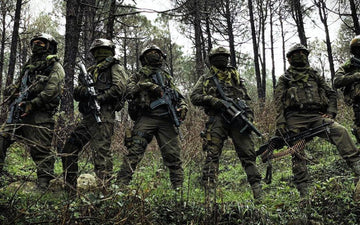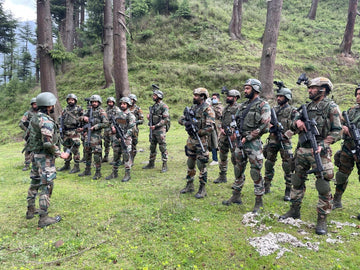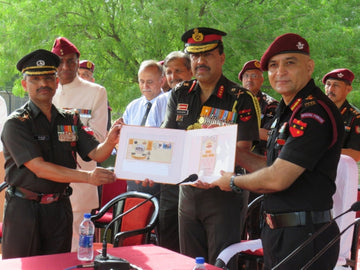Understanding the Importance of SSB Interviews
The SSB interview is designed not just to evaluate a candidate’s knowledge but to assess their suitability for a career in the armed forces through a comprehensive evaluation process that spans five days. Each candidate undergoes a series of psychological tests, group tasks, and personal interviews, with the aim being to identify individuals who exemplify the qualities of a leader, soldier, and team player. It's not merely a test of knowledge but also of one’s character, resilience, and ability to function under pressure.
With the looming changes in the armed forces and the global landscape in 2025, candidates must also stay informed of current affairs and possess the ability to articulate their thoughts clearly and compellingly.
Historical Context of the SSB Selection Process
The SSB interview process has evolved significantly since its inception. Originally formed post-World War II, the SSB aimed to identify individuals with leadership potential for the newly independent India. Over the decades, the approach has shifted from a singular focus on physical prowess to a holistic evaluation of personality traits, intellectual capabilities, and psychological resilience. As we head into 2025, the interview process now leverages advanced assessment tools and psychological insights to gauge candidates comprehensively.
Types of Questions in the SSB Interview
Personal and Behavioral Questions
Personal and behavioral questions are prevalent in the SSB interview, functioning as a means to gauge a candidate’s character, values, and motivations. Here are some key examples and how to tackle them:
-
"What are some of your strengths?"
- This question is an opportunity to highlight your self-awareness. Instead of giving a generic answer, focus on two or three specific strengths such as leadership, critical thinking, or adaptability. For instance, you might say: "One of my strengths is my leadership ability. In my previous role as a team leader during a college project, I coordinated tasks among ten members, ensuring that everyone met their deadlines while maintaining teamwork. This experience taught me the importance of delegation while fostering collaboration."
-
"Why do you want to join the armed forces?"
- It’s crucial to articulate sincere motivations. A robust answer might include personal stories or external influences, such as family heritage or personal experiences that inspired your desire to serve. "Joining the armed forces has always been a dream of mine since childhood, inspired by my grandfather who served with distinction. I aim to uphold his legacy, contributing to national security and deeply valuing the sense of duty and honor that comes with being part of an elite organization."
-
"What motivates you to achieve your goals?"
- Discuss how you handle both success and adversity, showcasing your drive. You could say: "My motivation comes from my passion for personal growth and service to others. For example, when I faced setbacks while preparing for the entrance exams, I used them as learning experiences. I reassessed my study techniques, incorporated feedback, and, ultimately, I succeeded, demonstrating my ability to adapt and persist."
Current Affairs and General Knowledge
Staying informed is critical in the context of an SSB interview. Candidates should be prepared to discuss recent events and their implications:
-
"What are the current major national and international issues?"
- Showcase your knowledge of significant problems, such as geopolitical tensions or environmental challenges. You could answer: "Currently, one pressing issue is climate change and its effects on global stability. As countries face natural disasters and resource shortages, I believe it's imperative for armed forces to play a role in disaster relief and humanitarian assistance, which is aligned with the contemporary role of the military."
-
"Who is the current Chief of Army/Navy/Air Staff?"
- Ensure you have all current personnel information at your fingertips. A solid answer would be: "The current Chief of Army Staff is General Manoj Pande, appointed in April 2022. His leadership is crucial as India navigates regional security threats, particularly along the northern borders."
Technical and Academic Questions
If you possess a specific academic background, be prepared for technical questions:
-
"Explain a particular concept or topic from your academic background."
- Keep your explanations logical and straightforward. "As a graduate in Mechanical Engineering, I can explain the principles of thermodynamics. For instance, the first law of thermodynamics illustrates the conservation of energy, suggesting that energy cannot be created or destroyed but can only change forms."
Psychological Assessment Questions
These questions probe how you deal with stress and challenges:
-
"How do you handle stress and pressure?"
- Discuss techniques and illustrate this with a personal example: "I handle stress through structured prioritization; during my final exams, I created a detailed study roster that divided topics into manageable sections, accompanied by short breaks. This approach not only reduced my anxiety but also ensured comprehensive preparation."
-
"Describe an instance where you had to make a quick decision."
- Share a real-life example that reflects your decision-making ability. "During a college trip, we lost our way, and I had to quickly devise a plan to navigate back. I broke the group into smaller teams with specific roles, assigned responsibilities, and within half an hour, we found our way back safely."
Group Task and Situational Questions
Group tasks evaluate teamwork, leadership, and problem-solving abilities:
-
"What did you perform best during your previous SSB?"
- Highlight strengths in collaboration and leadership by discussing a successful group project or task where you contributed significantly: "In my last SSB attempt, I stood out during a group task where I facilitated discussions, ensured all voices were heard, and contributed to devising a comprehensive plan that led to our success in the task."
-
"What will you do if a lion charges toward you?"
- Such situational questions emphasize your ability to think on your feet. You might respond: "In such a situation, I would assess my options quickly—look for a safe vantage point, stay calm, and avoid sudden movements. Planning an escape route while remaining aware of my surroundings could be a prudent strategy."
The SSB Assessment Process
The SSB assessment process consists of five days filled with varied evaluations:
-
Reporting at the Movement Control Office (MTO):
Candidates arrive and undergo initial administrative checks.
-
Screening Test:
This includes an OIR (Officer Intelligence Rating) test and PPDT (Picture Perception and Discussion Test) aimed at evaluating intelligence and personality through group discussions and individual impressions.
-
Psychology Test:
Various psychological assessments, such as the Thematic Apperception Test (TAT), are used to evaluate personality and thought processes.
-
Group Test:
Candidates participate in various group activities that assess leadership, teamwork, and communication skills.
-
Final Assessment:
This stage includes further personal interviews and feedback from earlier tests to form a holistic judgment of each candidate’s suitability.
Effective Tips for Answering Questions
Clarity and Honesty
- When answering questions, ensure you are clear and straightforward. Avoid beating around the bush; directly addressing the question reflects confidence.
Preparation
- Holistic preparation is key. Engage in public speaking exercises and stay updated with current affairs to sharpen your communication skills. Consider practicing with mock interviews or joining groups focused on current events.
Self-Awareness
- Reflect on your personal journey, acknowledging both strengths and areas for improvement. When discussing past rejections, emphasize growth and learning, highlighting what you have done differently to prepare for the current attempt.
Logical Thinking
- For situational questions, logical reasoning is critical. Take a moment to gather your thoughts. Break the problem down in a structured manner, outline possible solutions, and present them coherently.
Resilience
- Emphasize your willingness to persist despite setbacks. Illustrate this by mentioning alternative career plans, but reaffirm your determination to succeed in the armed forces.
Case Studies: Real-World Applications
One inspiring example is that of Major Anil Kumar, who faced setbacks during his initial attempts at the SSB interview. After numerous rejections, he revamped his preparation strategy, focusing on both physical fitness and psychological endurance. Ultimately, he succeeded, demonstrating that persistence combined with focused preparation yields results. His journey not only serves as motivation but illustrates that failure is merely a stepping stone on the path to success.
Statistical Data and Research Insights
Recent statistics reveal that approximately 1 in 100 candidates for the armed forces make it through the SSB, indicating the competitive nature of the selection process. Moreover, research backs the efficacy of teamwork and group interactions in fostering leadership qualities, aligning with the SSB's emphasis on these traits.
Challenges and Solutions
Some common challenges candidates face include anxiety, inadequate preparation, or a lack of awareness regarding current affairs. To address these issues:
- Practice mindfulness techniques, like meditation to alleviate anxiety.
- Form study groups to keep abreast of current affairs and foster discussions that enhance understanding.
- Utilize resources such as SSBCrack’s books and online courses for comprehensive preparation.
Future Trends and Predictions
Looking ahead, the SSB selection process is likely to adapt to include more technological tools, using AI-driven assessments and enhancing psychological evaluation methods. This evolution aims to make the selection process more comprehensive and fair, taking into account diverse candidate backgrounds.
Conclusion
Preparing for the SSB interview is an intricate process that demands thorough understanding, self-awareness, and effective communication. By familiarizing yourself with the types of questions you may encounter and crafting thoughtful responses, you can enhance your prospects of success significantly.
The road to joining the armed forces is demanding, but with dedication and the right strategies, you can navigate this journey successfully. As you embark on this endeavor, remember that resilience in the face of challenges and a commitment to self-improvement will ultimately define your experience more than any specific interview question. Start your preparation today, utilize resources like SSBCrack, and take that bold step toward serving your nation on a larger scale.





